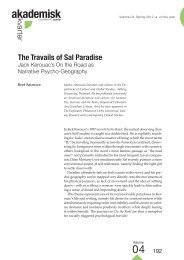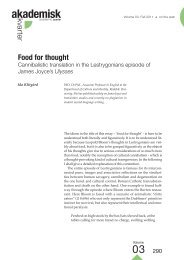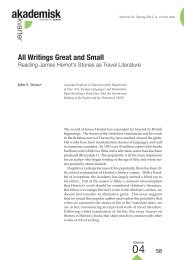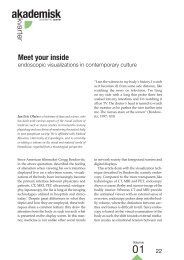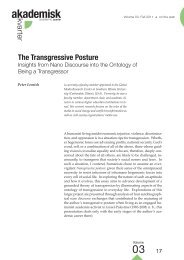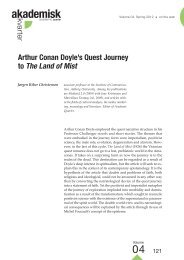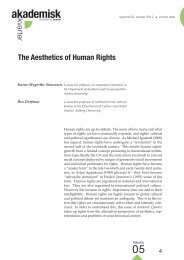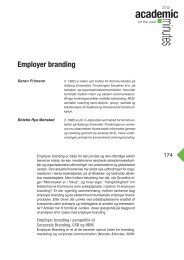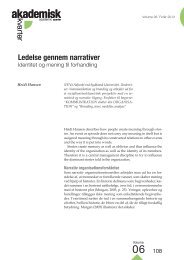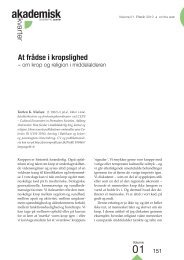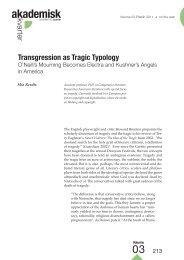- Page 1 and 2:
Volume 03 12 • 2011Aalborg Univer
- Page 3 and 4:
Aalborg Universitetakademiskacademi
- Page 5 and 6:
akademiskacademic quarterkvarterTra
- Page 7 and 8:
akademiskacademic quarterkvarterTra
- Page 9 and 10:
akademiskacademic quarterkvarterTra
- Page 11 and 12:
akademiskacademic quarterkvarterTra
- Page 13 and 14:
akademiskacademic quarterkvarterTra
- Page 15 and 16:
akademiskacademic quarterkvarterTra
- Page 17 and 18:
akademiskacademic quarterkvarterVol
- Page 19 and 20:
akademiskacademic quarterkvarterThe
- Page 21 and 22:
akademiskacademic quarterkvarterThe
- Page 23 and 24:
akademiskacademic quarterkvarterThe
- Page 25 and 26:
akademiskacademic quarterkvarterThe
- Page 27 and 28:
akademiskacademic quarterkvarterThe
- Page 29 and 30:
akademiskacademic quarterkvarterThe
- Page 31 and 32:
akademiskacademic quarterkvarterThe
- Page 33 and 34:
akademiskacademic quarterkvarterThe
- Page 35 and 36:
akademiskacademic quarterkvarterThe
- Page 37 and 38:
akademiskacademic quarterkvarterThe
- Page 39 and 40:
akademiskacademic quarterkvarterThe
- Page 41 and 42:
akademiskacademic quarterkvarterThe
- Page 43 and 44:
akademiskacademic quarterkvarterThe
- Page 45 and 46:
akademiskacademic quarterkvarterThe
- Page 47 and 48:
akademiskacademic quarterkvarterThe
- Page 49 and 50:
akademiskacademic quarterkvarterVol
- Page 51 and 52:
akademiskacademic quarterkvarterDem
- Page 53 and 54:
akademiskacademic quarterkvarterDem
- Page 55 and 56:
akademiskacademic quarterkvarterDem
- Page 57 and 58:
akademiskacademic quarterkvarterDem
- Page 59 and 60:
akademiskacademic quarterkvarterDem
- Page 61 and 62:
akademiskacademic quarterkvarterDem
- Page 63 and 64:
akademiskacademic quarterkvarterDem
- Page 65 and 66:
akademiskacademic quarterkvarterDem
- Page 67 and 68:
akademiskacademic quarterkvarterTea
- Page 69 and 70:
akademiskacademic quarterkvarterTea
- Page 71 and 72:
akademiskacademic quarterkvarterTea
- Page 73 and 74:
akademiskacademic quarterkvarterTea
- Page 75 and 76:
akademiskacademic quarterkvarterTea
- Page 77 and 78:
akademiskacademic quarterkvarterTea
- Page 79 and 80:
akademiskacademic quarterkvarterTea
- Page 81 and 82:
akademiskacademic quarterkvarterVol
- Page 83 and 84:
akademiskacademic quarterkvarterFor
- Page 85 and 86:
akademiskacademic quarterkvarterFor
- Page 87 and 88:
akademiskacademic quarterkvarterFor
- Page 89 and 90:
akademiskacademic quarterkvarterFor
- Page 91 and 92:
akademiskacademic quarterkvarterFor
- Page 93 and 94:
akademiskacademic quarterkvarterVol
- Page 95 and 96:
akademiskacademic quarterkvarter”
- Page 97 and 98:
akademiskacademic quarterkvarter”
- Page 99 and 100:
akademiskacademic quarterkvarter”
- Page 101 and 102:
akademiskacademic quarterkvarter”
- Page 103 and 104:
akademiskacademic quarterkvarter”
- Page 105 and 106:
akademiskacademic quarterkvarter”
- Page 107 and 108:
akademiskacademic quarterkvarterVol
- Page 109 and 110: akademiskacademic quarterkvarterDol
- Page 111 and 112: akademiskacademic quarterkvarterDol
- Page 113 and 114: akademiskacademic quarterkvarterDol
- Page 115 and 116: akademiskacademic quarterkvarterDol
- Page 117 and 118: akademiskacademic quarterkvarterDol
- Page 119 and 120: akademiskacademic quarterkvarterDol
- Page 121 and 122: akademiskacademic quarterkvarterVol
- Page 123 and 124: akademiskacademic quarterkvarterIco
- Page 125 and 126: akademiskacademic quarterkvarterIco
- Page 127 and 128: akademiskacademic quarterkvarterIco
- Page 129 and 130: akademiskacademic quarterkvarterIco
- Page 131 and 132: akademiskacademic quarterkvarterIco
- Page 133 and 134: akademiskacademic quarterkvarterIco
- Page 135 and 136: akademiskacademic quarterkvarterVol
- Page 137 and 138: akademiskacademic quarterkvarterThe
- Page 139 and 140: akademiskacademic quarterkvarterThe
- Page 141 and 142: akademiskacademic quarterkvarterThe
- Page 143 and 144: akademiskacademic quarterkvarterThe
- Page 145 and 146: akademiskacademic quarterkvarterThe
- Page 147 and 148: akademiskacademic quarterkvarterVol
- Page 149 and 150: akademiskacademic quarterkvarterTra
- Page 151 and 152: akademiskacademic quarterkvarterTra
- Page 153 and 154: akademiskacademic quarterkvarterTra
- Page 155 and 156: akademiskacademic quarterkvarterTra
- Page 157 and 158: akademiskacademic quarterkvarterTra
- Page 159: akademiskacademic quarterkvarterVol
- Page 163 and 164: akademiskacademic quarterkvarterFli
- Page 165 and 166: akademiskacademic quarterkvarterFli
- Page 167 and 168: akademiskacademic quarterkvarterFli
- Page 169 and 170: akademiskacademic quarterkvarterFli
- Page 171 and 172: akademiskacademic quarterkvarterFli
- Page 173 and 174: akademiskacademic quarterkvarterFli
- Page 175 and 176: akademiskacademic quarterkvarterFli
- Page 177 and 178: akademiskacademic quarterkvarterFli
- Page 179 and 180: akademiskacademic quarterkvarterVol
- Page 181 and 182: akademiskacademic quarterkvarterEn
- Page 183 and 184: akademiskacademic quarterkvarterEn
- Page 185 and 186: akademiskacademic quarterkvarterEn
- Page 187 and 188: akademiskacademic quarterkvarterEn
- Page 189 and 190: akademiskacademic quarterkvarterEn
- Page 191 and 192: akademiskacademic quarterkvarterEn
- Page 193 and 194: akademiskacademic quarterkvarterEn
- Page 195 and 196: akademiskacademic quarterkvarterDoe
- Page 197 and 198: akademiskacademic quarterkvarterDoe
- Page 199 and 200: akademiskacademic quarterkvarterDoe
- Page 201 and 202: akademiskacademic quarterkvarterDoe
- Page 203 and 204: akademiskacademic quarterkvarterDoe
- Page 205 and 206: akademiskacademic quarterkvarterDoe
- Page 207 and 208: akademiskacademic quarterkvarterDoe
- Page 209 and 210: akademiskacademic quarterkvarterDoe
- Page 211 and 212:
akademiskacademic quarterkvarterDoe
- Page 213 and 214:
akademiskacademic quarterkvarterVol
- Page 215 and 216:
akademiskacademic quarterkvarterTra
- Page 217 and 218:
akademiskacademic quarterkvarterTra
- Page 219 and 220:
akademiskacademic quarterkvarterTra
- Page 221 and 222:
akademiskacademic quarterkvarterTra
- Page 223 and 224:
akademiskacademic quarterkvarterTra
- Page 225 and 226:
akademiskacademic quarterkvarterTra
- Page 227 and 228:
akademiskacademic quarterkvarterTra
- Page 229 and 230:
akademiskacademic quarterkvarterTra
- Page 231 and 232:
akademiskacademic quarterkvarterVol
- Page 233 and 234:
akademiskacademic quarterkvarterRel
- Page 235 and 236:
akademiskacademic quarterkvarterRel
- Page 237 and 238:
akademiskacademic quarterkvarterRel
- Page 239 and 240:
akademiskacademic quarterkvarterRel
- Page 241 and 242:
akademiskacademic quarterkvarterRel
- Page 243 and 244:
akademiskacademic quarterkvarterRel
- Page 245 and 246:
akademiskacademic quarterkvarterRel
- Page 247 and 248:
akademiskacademic quarterkvarterOnt
- Page 249 and 250:
akademiskacademic quarterkvarterOnt
- Page 251 and 252:
akademiskacademic quarterkvarterOnt
- Page 253 and 254:
akademiskacademic quarterkvarterOnt
- Page 255 and 256:
akademiskacademic quarterkvarterOnt
- Page 257 and 258:
akademiskacademic quarterkvarterOnt
- Page 259 and 260:
akademiskacademic quarterkvarterGen
- Page 261 and 262:
akademiskacademic quarterkvarterGen
- Page 263 and 264:
akademiskacademic quarterkvarterGen
- Page 265 and 266:
akademiskacademic quarterkvarterGen
- Page 267 and 268:
akademiskacademic quarterkvarterGen
- Page 269 and 270:
akademiskacademic quarterkvarterVol
- Page 271 and 272:
akademiskacademic quarterkvarterGr
- Page 273 and 274:
akademiskacademic quarterkvarterGr
- Page 275 and 276:
akademiskacademic quarterkvarterGr
- Page 277 and 278:
akademiskacademic quarterkvarterGr
- Page 279 and 280:
akademiskacademic quarterkvarterGr
- Page 281 and 282:
akademiskacademic quarterkvarterVol
- Page 283 and 284:
akademiskacademic quarterkvarterThe
- Page 285 and 286:
akademiskacademic quarterkvarterThe
- Page 287 and 288:
akademiskacademic quarterkvarterThe
- Page 289 and 290:
akademiskacademic quarterkvarterThe
- Page 291 and 292:
akademiskacademic quarterkvarterFoo
- Page 293 and 294:
akademiskacademic quarterkvarterFoo
- Page 295 and 296:
akademiskacademic quarterkvarterFoo
- Page 297 and 298:
akademiskacademic quarterkvarterFoo
- Page 299 and 300:
akademiskacademic quarterkvarterFoo
- Page 301 and 302:
akademiskacademic quarterkvarterFoo
- Page 303 and 304:
akademiskacademic quarterkvarterFoo
- Page 305 and 306:
akademiskacademic quarterkvarterFoo
- Page 307 and 308:
akademiskacademic quarterkvarterBod
- Page 309 and 310:
akademiskacademic quarterkvarterBod
- Page 311 and 312:
akademiskacademic quarterkvarterBod
- Page 313 and 314:
akademiskacademic quarterkvarterBod
- Page 315:
akademiskacademic quarterkvarterBod



